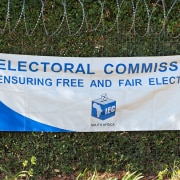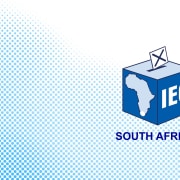|
Getting your Trinity Audio player ready...
|
Image: IEC
The Independent Electoral Commission (IEC) of South Africa calls on all South Africans to join the national dialogue on the potential implementation of electronic voting systems in the country’s electoral processes. The deadline for submissions is Tuesday 30 September 2025.
Electronic voting (e-voting) refers to any voting system where votes are cast or counted wholly or partially by electronic means.
The IEC has released a discussion document on the proposed changes, saying the exploration into the possibilities of electronic voting is a “pivotal moment in our democracy”.
“E-voting could transform how we participate in democracy, making voting more accessible and efficient,” adds the commission.
Public participation in government is one of the foundations of democracy. Indeed, a well-functioning democracy demands the active and informed participation of citizens in political processes such as elections, development of laws and policies, or holding elected officials accountable.
But this would be a radical change in how South Africa conducts its elections and so, says the IEC, this is just the beginning of a careful consultation process. It is NOT a decision to implement e-voting. “If South Africa eventually decides to adopt electronic voting, it would be a long-term project requiring extensive planning and public input.”
How you can participate
- Review the available material to inform yourself about the options, benefits, and challenges.
- Submit your feedback via e-mail or postal service – details are provided below.
- Attend upcoming public forums in your province – follow the IEC’s social pages for notifications.
- Join the conversation on social media using #SAeVoting or #SAeVoting2025.
- Organise community discussions and submit group feedback to info@elections.org.za.
- Share your views on the IEC’s social media pages @IECSouthAfrica.
Submit your feedback by no later than Tuesday, 30 September 2025.
- E-mail: evoting@elections.org.za
- Postal address: Electoral Commission of South Africa Private Bag X112 Centurion, 0046
- Subject: E-Voting Consultation
Why e-voting?
The commission names several key reasons for its decision to now drive this important national conversation:
- Growing public interest: South Africans across all communities have shown increasing interest in how technology could improve our voting system. This builds on the first e-voting conference held in 2013.
- Advancing technology: Digital technology and cybersecurity have advanced significantly in recent years. The IEC has a duty to explore whether these developments could make voting more efficient and accessible for all South Africans.
- Changing voter demographics: With more tech-savvy young voters joining our democracy, the IEC needs to evaluate if current voting methods best serve everyone’s needs.
- Challenges with manual voting: The manual voting system faces some challenges, especially with an increasingly complex electoral system and a growing population. The IEC needs to examine if technology could help address these issues.
- African leadership: Several African nations are already exploring electronic voting. With South Africa’s strong democratic institutions and infrastructure, the country should be part of this important continental conversation.
“As we consider this important evolution in our democracy, your insights, concerns, and feedback are essential to ensuring any future system reflects the needs and values of all South Africans,” the commission comments.
How does e-voting work?
There are three main types of e-voting systems, says the IEC. They are:
- Internet voting –
- Allows voters to cast ballots from any computer with internet access. Can be done from home, work, or designated voting stations.
- Uses encryption and security protocols to protect vote integrity.
- Direct recording e-voting machines –
- Voters mark paper ballots which are then scanned and counted electronically. Combines physical paper records with electronic counting.
- Often seen as a good compromise between traditional and fully electronic voting.
- Electronic counting systems –
- Voters cast their votes directly on a computer terminal, known as an electronic voting machine. The machine records and stores votes digitally.
- May provide a paper backup of each vote (called a voter-verified paper audit trail).
Advantages and risks
Predictably, there are both risks and benefits to using an e-voting system. Minimising the former and maximising the latter will take careful research, discussion, and input from all sectors of society.
IEC chairperson Mosotho Moepya says the conversation is already under way. “A key finding from our recent studies on e-voting and public perceptions in South Africa is that e-voting is one of the most talked-about topics among South Africans, and even more so among young people in our country.”
He adds that the commission sees a high level of enthusiasm for e-voting among South African youth, including “unbridled optimism” about its ability to increase voter turnout, facilitate and speed up voting, and contribute to the faster processing of election results, among others.
The advantages include:
- Improved electoral efficiency: Faster vote counting and result tabulation and reduced human error in vote counting.
- Potential to boost voter turnout, especially among younger, more digitally literate voters.
- Potential for increased accessibility for disabled voters.
- Can help prevent certain types of electoral fraud.
- Enables more efficient elections in a larger population.
The risks include:
- Cybersecurity risks and potential for hacking.
- Need for robust back-up systems.
- Voter trust and transparency concerns.
- Digital divide and accessibility issues.
- Initial set-up costs and technical infrastructure requirements.
- Need for voter education and training.
Accordingly, the IEC has allocated at least six months for comprehensive public debate on implementing e-voting technologies in South Africa. This consultation period provides an opportunity for all stakeholders – including citizens, civil society organisations, technology experts, and political parties – to voice their views and concerns about e-voting.
“Ultimately, the Electoral Commission hopes that the country will craft a concrete policy discussion document, in the form of a green paper on e-voting, that will lead to clear considerations and choices regarding the country’s policy direction and options on e-voting,” says Moepya.
Further steps would involve the review of public submissions throughout October 2025, the publication of consultation findings during November 2025, and the drafting of the green paper by March 2026. A white paper, or formal policy document, will follow the green paper.
Parliament will also evaluate the feedback, which will help it determine whether to authorise the IEC to proceed with e-voting trials. The decision-making process will involve:
- Assessment of technical feasibility and security requirements.
- Evaluation of infrastructure readiness across the country.
- Analysis of implementation costs and resource requirements.
- Review of necessary legislative amendments.
- Consideration of international best practices and lessons learned
Should Parliament approve the initiative, explains the commission, the implementation would follow a carefully phased approach over several years. This gradual transition could include:
- Pilot testing in selected voting districts.
- Comprehensive voter education programmes.
- Regular security audits and system assessments.
- Ongoing stakeholder consultation and feedback integration.
- Progressive roll-out based on success metrics and public confidence.







